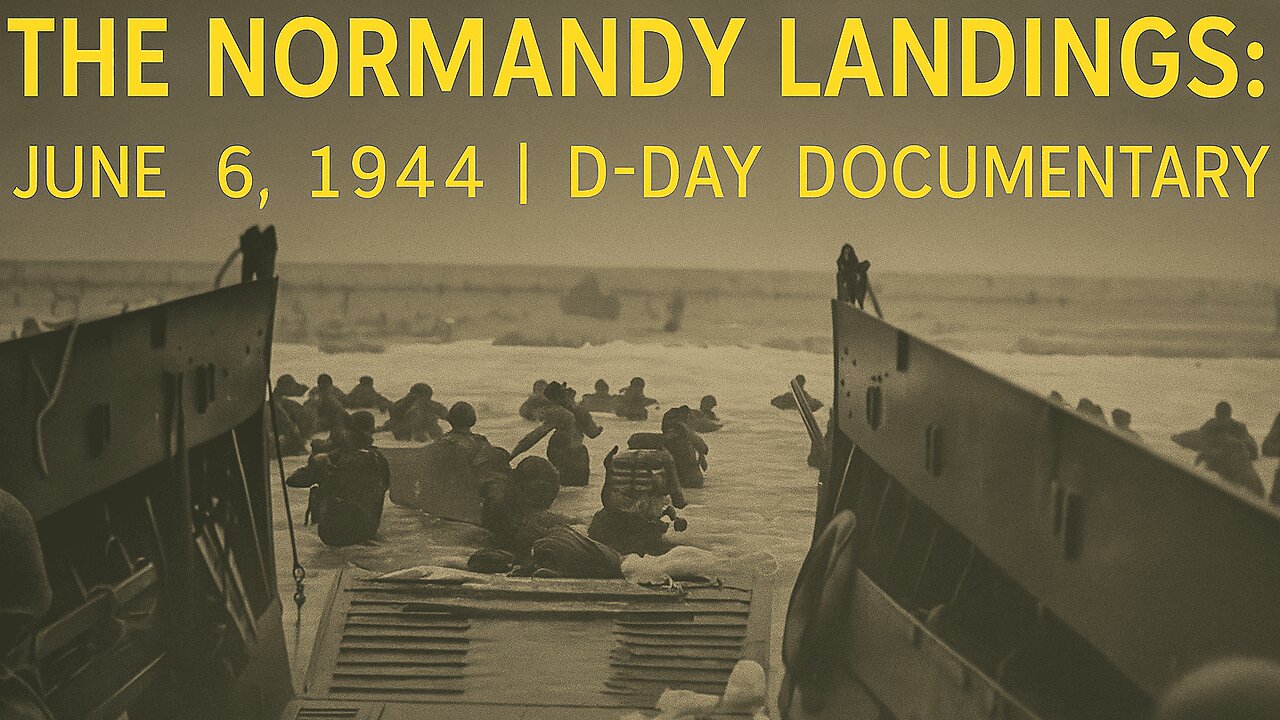Premium Only Content

Inside D-Day: How the Normandy Landings Changed World War II Forever
Between 1939 and 1941, Hitler’s forces carved a bloody path through Europe, leaving nations crushed under the swastika. Only Britain stood defiant, battered yet unbroken, buying time for a counterblow that would one day reclaim the continent. That blow came in 1944 on the beaches of Normandy, a single strike that tore open the walls of Fortress Europe and began the downfall of tyranny. In 1941, Japan’s attack on Pearl Harbor dragged the United States into war, prompting Hitler to declare war on America—a reckless act that sealed his fate. The vast power of American industry and manpower now joined Britain, Canada, and the Free Nations in a coalition that would shape the world’s destiny. Yet the path to D-Day was anything but simple. Stalin demanded a second front in 1942, but Churchill and Roosevelt delayed; their forces were still bleeding in North Africa, their armies unready, their supply lines fragile. Instead, a small-scale raid on Dieppe in 1942—Operation Jubilee—was launched to test German defenses. It ended in disaster. Of 10,500 troops, mostly Canadians, nearly 1,500 were killed, thousands captured, ships lost, and planes shot down. But Dieppe became a brutal lesson: storming Europe without preparation was suicide. While plans for invasion stalled, Montgomery’s British forces struck back in North Africa, halting Rommel’s Afrika Korps at El Alamein. The Americans joined in with Operation Torch, squeezing Axis forces from both sides until Africa was cleared. The next target—Italy—was dubbed by Churchill as Europe’s “soft underbelly.” Allied troops invaded Sicily in 1943, toppling Mussolini’s fascist regime, but German forces turned Italy into a fortress, stalling the advance once again. Meanwhile, Allied leaders debated where and how to strike Western Europe. Eisenhower, chosen to lead Operation Overlord, lacked frontline combat experience but possessed a rare talent—unifying egos, nations, and generals into one purpose. His leadership ensured that D-Day would be a single, colossal invasion, not three separate national assaults. The question remained: where to land? The obvious target was Pas-de-Calais—the shortest route across the Channel—but the Germans expected that. The 15th Army under von Salmuth was waiting there behind some of the strongest fortifications in the Reich. So British General Frederick Morgan proposed a bolder choice: Normandy. Longer crossing, rougher terrain, but weaker defenses and a better chance of surprise. His analysis in 1943 convinced the Allied command that when the time came—likely May 1944—Normandy would be the place.
-
 7:51
7:51
Dr. Nick Zyrowski
6 hours agoHow To Starve Fat Cells - Not Yourself!
6.2K2 -
 LIVE
LIVE
The HotSeat With Todd Spears
1 hour agoEP 211: Less Religion, More JESUS!
565 watching -
![[Ep 794] Epstein Act | MTG 2.0 [Liz Cheney?] | Crooks, Furries, & Social Media | Guest – Sam Anthony](https://1a-1791.com/video/fww1/1b/s8/1/u/D/2/A/uD2Az.0kob-small-Ep-794-Epstein-Act-MTG-2.0-.jpg) LIVE
LIVE
The Nunn Report - w/ Dan Nunn
1 hour ago[Ep 794] Epstein Act | MTG 2.0 [Liz Cheney?] | Crooks, Furries, & Social Media | Guest – Sam Anthony
170 watching -
 1:06:52
1:06:52
DeVory Darkins
3 hours agoBREAKING: Congress issue MAJOR EPSTEIN Update as MTG goes OFF THE RAILS
111K106 -
 2:06:23
2:06:23
Side Scrollers Podcast
5 hours agoStreamer Awards WRECKED + Cloudfare OUTAGE + AI LOVED ONES?! + More | Side Scrollers
31.9K3 -
 1:57:30
1:57:30
Steven Crowder
6 hours agoSteven Crowder is a Deep State Agent
552K448 -
 1:04:17
1:04:17
Sean Unpaved
4 hours agoJames Franklin Is Going To REVIVE Virginia Tech! | UNPAVED
28.4K2 -
 LIVE
LIVE
Viss
7 hours ago🔴LIVE - Completing Quests & Annihilating All in Our Path! - Arc Raiders!
88 watching -
 53:51
53:51
The Rubin Report
5 hours agoBill Maher Obliterates Patton Oswalt’s Liberal Bubble in Only 2 Minutes
62.3K71 -
 LIVE
LIVE
LumpyPotatoX2
5 hours agoWhere Winds Meet: Just Petting Kitties - Made in China
35 watching